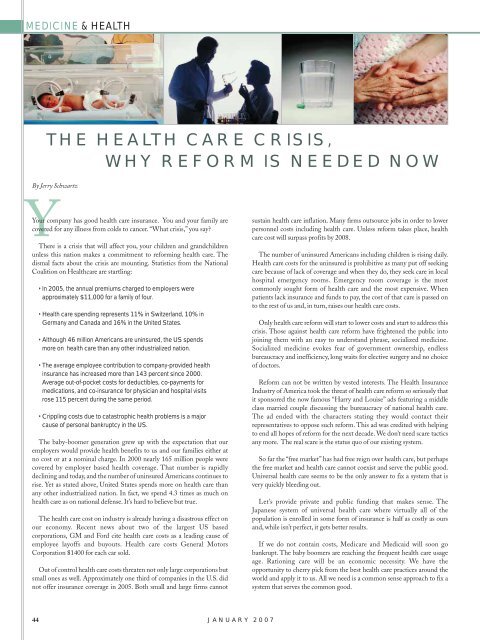Have a Happy & Healthy New Year! - the Parklander
Have a Happy & Healthy New Year! - the Parklander
Have a Happy & Healthy New Year! - the Parklander
Create successful ePaper yourself
Turn your PDF publications into a flip-book with our unique Google optimized e-Paper software.
MEDICINE & HEALTH<br />
THE HEALTH CARE CRISIS,<br />
WHY REFORM IS NEEDED NOW<br />
By Jerry Schwartz<br />
Your company has good health care insurance. You and your family are<br />
covered for any illness from colds to cancer. “What crisis,” you say?<br />
There is a crisis that will affect you, your children and grandchildren<br />
unless this nation makes a commitment to reforming health care. The<br />
dismal facts about <strong>the</strong> crisis are mounting. Statistics from <strong>the</strong> National<br />
Coalition on Healthcare are startling:<br />
• In 2005, <strong>the</strong> annual premiums charged to employers were<br />
approximately $11,000 for a family of four.<br />
• Health care spending represents 11% in Switzerland, 10% in<br />
Germany and Canada and 16% in <strong>the</strong> United States.<br />
• Although 46 million Americans are uninsured, <strong>the</strong> US spends<br />
more on health care than any o<strong>the</strong>r industrialized nation.<br />
• The average employee contribution to company-provided health<br />
insurance has increased more than 143 percent since 2000.<br />
Average out-of-pocket costs for deductibles, co-payments for<br />
medications, and co-insurance for physician and hospital visits<br />
rose 115 percent during <strong>the</strong> same period.<br />
• Crippling costs due to catastrophic health problems is a major<br />
cause of personal bankruptcy in <strong>the</strong> US.<br />
The baby-boomer generation grew up with <strong>the</strong> expectation that our<br />
employers would provide health benefits to us and our families ei<strong>the</strong>r at<br />
no cost or at a nominal charge. In 2000 nearly 165 million people were<br />
covered by employer based health coverage. That number is rapidly<br />
declining and today, and <strong>the</strong> number of uninsured Americans continues to<br />
rise. Yet as stated above, United States spends more on health care than<br />
any o<strong>the</strong>r industrialized nation. In fact, we spend 4.3 times as much on<br />
health care as on national defense. It’s hard to believe but true.<br />
The health care cost on industry is already having a disastrous effect on<br />
our economy. Recent news about two of <strong>the</strong> largest US based<br />
corporations, GM and Ford cite health care costs as a leading cause of<br />
employee layoffs and buyouts. Health care costs General Motors<br />
Corporation $1400 for each car sold.<br />
Out of control health care costs threaten not only large corporations but<br />
small ones as well. Approximately one third of companies in <strong>the</strong> U.S. did<br />
not offer insurance coverage in 2005. Both small and large firms cannot<br />
44 JANUARY 2007<br />
sustain health care inflation. Many firms outsource jobs in order to lower<br />
personnel costs including health care. Unless reform takes place, health<br />
care cost will surpass profits by 2008.<br />
The number of uninsured Americans including children is rising daily.<br />
Health care costs for <strong>the</strong> uninsured is prohibitive as many put off seeking<br />
care because of lack of coverage and when <strong>the</strong>y do, <strong>the</strong>y seek care in local<br />
hospital emergency rooms. Emergency room coverage is <strong>the</strong> most<br />
commonly sought form of health care and <strong>the</strong> most expensive. When<br />
patients lack insurance and funds to pay, <strong>the</strong> cost of that care is passed on<br />
to <strong>the</strong> rest of us and, in turn, raises our health care costs.<br />
Only health care reform will start to lower costs and start to address this<br />
crisis. Those against health care reform have frightened <strong>the</strong> public into<br />
joining <strong>the</strong>m with an easy to understand phrase, socialized medicine.<br />
Socialized medicine evokes fear of government ownership, endless<br />
bureaucracy and inefficiency, long waits for elective surgery and no choice<br />
of doctors.<br />
Reform can not be written by vested interests. The Health Insurance<br />
Industry of America took <strong>the</strong> threat of health care reform so seriously that<br />
it sponsored <strong>the</strong> now famous “Harry and Louise” ads featuring a middle<br />
class married couple discussing <strong>the</strong> bureaucracy of national health care.<br />
The ad ended with <strong>the</strong> characters stating <strong>the</strong>y would contact <strong>the</strong>ir<br />
representatives to oppose such reform. This ad was credited with helping<br />
to end all hopes of reform for <strong>the</strong> next decade. We don’t need scare tactics<br />
any more. The real scare is <strong>the</strong> status quo of our existing system.<br />
So far <strong>the</strong> “free market” has had free reign over health care, but perhaps<br />
<strong>the</strong> free market and health care cannot coexist and serve <strong>the</strong> public good.<br />
Universal health care seems to be <strong>the</strong> only answer to fix a system that is<br />
very quickly bleeding out.<br />
Let’s provide private and public funding that makes sense. The<br />
Japanese system of universal health care where virtually all of <strong>the</strong><br />
population is enrolled in some form of insurance is half as costly as ours<br />
and, while isn’t perfect, it gets better results.<br />
If we do not contain costs, Medicare and Medicaid will soon go<br />
bankrupt. The baby boomers are reaching <strong>the</strong> frequent health care usage<br />
age. Rationing care will be an economic necessity. We have <strong>the</strong><br />
opportunity to cherry pick from <strong>the</strong> best health care practices around <strong>the</strong><br />
world and apply it to us. All we need is a common sense approach to fix a<br />
system that serves <strong>the</strong> common good.

















